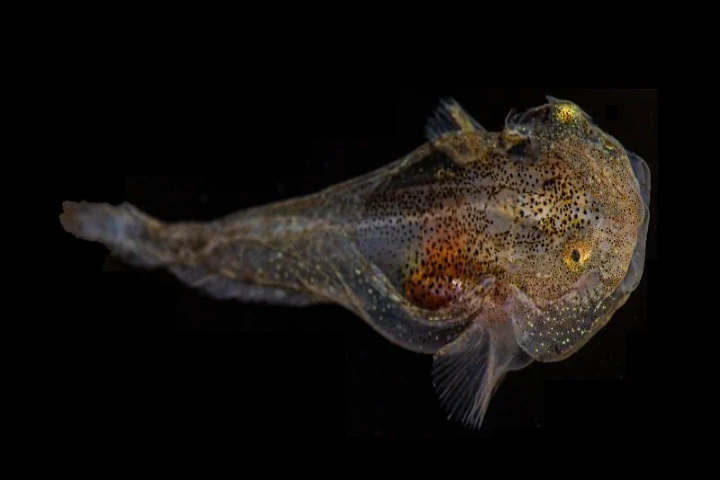

This small-sized snailfish lives in frigid Arctic thanks to an overload of anti-freeze proteins (Pic. Courtesy John Sparks and David Gruber)
Nature’s ways are not just mysterious but also amazing as scientists discover new facts about different species of plants and animals. This came to the fore in 2019 when researchers – David Gruber and John Sparks — from the American Museum of Natural History diving into frigid waters of Greenland happen to see a snailfish which radiated red and green hues as per a report in smithsonianmag.com.
Inhabiting deep sea iceberg crevices, its capability to glow is rare among Arctic fish, according to the statement issued by the museum. This egged the researchers to pick up a juvenile snailfish to get a better understanding of this sea snail’s genes. Interestingly, this creature is the size of a fingernail.
The sequencing of snailfish’s genes revealed something which was astonishing. The creature has a large number of genes that are capable of creating antifreeze proteins that help the fish avoid getting frozen.
Talking about this aspect, Gruber in the statement said: “Similar to how antifreeze in your car keeps the water in your radiator from freezing in cold temperatures, some animals have evolved amazing machinery that prevent them from freezing.”
This antifreeze attribute of the fish dwelling in deep waters is rather very important as it enables it to prevent ice crystals from forming inside its body and thus live in places where the temperature of water is below the freezing point of its blood. Sharing details, Gruber said: “We already knew that this tiny snailfish, which lives in extremely cold waters, produced antifreeze proteins, but we didn’t realize just how chock-full of those proteins it is.”
Details of the study which were published in the journal Evolutionary Bioinformatics elaborated that Gruber and others scrutinised the transcriptome or the portion of organism’s genome that has active protein-coding of the juvenile variegated snailfish (Liparis gibbus) and discovered that that it had the highest level of antifreeze proteins ever recorded.
In conversation with Popular Science, Gruber said: “In retrospect it makes sense — of course a juvenile fish living on an iceberg is making lots of proteins that prevent it from freezing.” Moreover, it became evident that this animal devoted a lot of energy to create these proteins.
Evolutionary biologist at the University of Illinois Urbana-Champaign, Chi-Hing Christina Cheng speaking to Popular Science highlighted an important point. While not being part of the study she said that the antifreeze proteins may be for another developmental reason and not for keeping the cold away. So, in lieu of examining the snailfish transcriptome, the researchers may look at how much of these antifreeze proteins are actually in the blood plasma of the fish.
Cheng said: “If all these detected transcripts are actually made into functional antifreeze proteins, the plasma antifreeze activity would be high. But if the plasma antifreeze activity is low, then it’s questionable that these transcripts are made into active antifreeze proteins.”
The threatening change in climate in the Arctic as it warms up will expose this species evolved to adapt to the cold to new risks, as per the scientists. With the environment undergoing a change, the snail fish’s habitat will alter too. As per the study, “more temperate species that were previously unable to survive in sub-zero seawater temperatures” could move in and compete with it for food.
The Arctic at the current rate of melting is expected to lose all its ice by 2040 and in this scenario, Gruber said the snailfish will be “in a freezer that had been left open overnight”. Summing up that situation, he told New Scientist: “It made us think, wow, I wonder what’s going to happen to this fish when there are no icebergs? Its superpower is no longer a superpower.”
Highlighting the use of indigenous platforms during Operation Sindoor, Chief of Defence Staff (CDS) General…
Congress MP Shashi Tharoor on Friday (local time) said that Colombia will issue a statement…
Minister for Electronics and Information Technology Ashwini Vaishnaw said on Friday that the government is…
Renowned human rights activist and political analyst Amjad Ayub Mirza has expressed a strong denunciation…
As was widely expected, the Indian economy grew by 6.5 per cent in real terms…
World No Tobacco Day, marked annually on 31 May, addresses a major public health challenge--the…